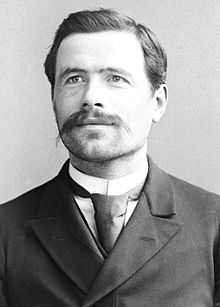Ravachol
François Claudius Koenigstein | |
|---|---|
 Ravachol | |
| Born | 14 October 1859 |
| Died | 11 July 1892 (aged 32) |
François Claudius Koenigstein, also known as Ravachol (1859–1892), was a French anarchist. He was born on 14 October 1859, at Saint-Chamond, Loire and died by being guillotined on 11 July 1892, at Montbrison after being twice found guilty of complicity in bombings.
Biography
François Koenigstein was born in Saint-Chamond, Loire as the eldest child of a Dutch father (Jean Adam Koenigstein) and a French mother (Marie Ravachol). As an adult, he adopted his mother's maiden name as his surname, following years of struggle after his father abandoned the family when François was only eight years old. From that time on he had to support his mother, sister, and brother; he also looked after his nephew. He eventually found work as a dyer's assistant, a job which he later lost. He was very poor throughout his life. For additional income he played accordion at society balls on Sundays at Saint-Étienne.
The bombings

Ravachol was a grave-robber before he became politically active. He joined the anarchists as well as groups organizing to improve working conditions. Labor unrest resulted in fierce reprisals by police. On 1 May 1891, at Fourmies, a workers' demonstration took place for the eight-hour day; confrontations with the police followed. The police opened fire on the crowd, resulting in nine deaths amongst the demonstrators. The same day, at Clichy, serious incidents erupted in a procession in which anarchists were taking part. Three men were arrested and taken to the commissariat of police. There they were interrogated (and brutalised with beatings, resulting in injuries). A trial (the Clichy Affair) ensued, in which two of the three anarchists were sentenced to prison terms (despite their abuse in jail.) In addition to these events, authorities kept up repression of the communards, which had continued from the time of the insurrection of the Paris Commune of 1871.
Ravachol was aroused to take action in 1892 against members of the judiciary. He placed bombs in the living quarters of the Advocate General, Léon Bulot (executive of the Public Ministry), and Edmond Benoît, the councillor who had presided over the Assises Court during the Clichy Affair.

An informant told of his actions, and Ravachol was arrested on 30 March 1892 for his bombings at the Restaurant Véry. The day before the trial, anarchists bombed the restaurant where the informant worked. Ravachol was tried at the Assises Court of Seine on 26 April. He was convicted and condemned to prison for life. On 23 June, Ravachol was condemned to death in a second trial at the Assises Court of Loire for three murders. His participation in two of them is disputed (he confessed only to the murder of the hermit of Montbrison, claiming it was due to his own poverty). On 11 July 1892, Ravachol was publicly guillotined.
On 9 December 1893, Auguste Vaillant threw a bomb into the French Chamber of Deputies to avenge Ravachol (the explosion injured one deputy).
The myth of Ravachol
Ravachol became a somewhat romanticised symbol of desperate revolt and a number of French songs were composed in his honour, such as la Ravachole, to the tune of la Carmagnole.
Ravachol has also appeared as a minor character in Frank Chadwick's role-playing game Space: 1889 as well as in several of his memoirs.
In 2011, the character of the anarchist "Claude Ravache" appeared in the movie Sherlock Holmes: A Game of Shadows. He was clearly inspired by Ravachol.
The 2019 video game developed by ZA/UM, Disco Elysium, takes place in Martinaise, a district of the city of Revachol, a clear reference to Ravachol. Also mentioned in the game is a city known as Koeningsten.
See also
References
- Maitron, Jean. Ravachol et les anarchistes, collection Archives, 1964, 216 p. (in French)
